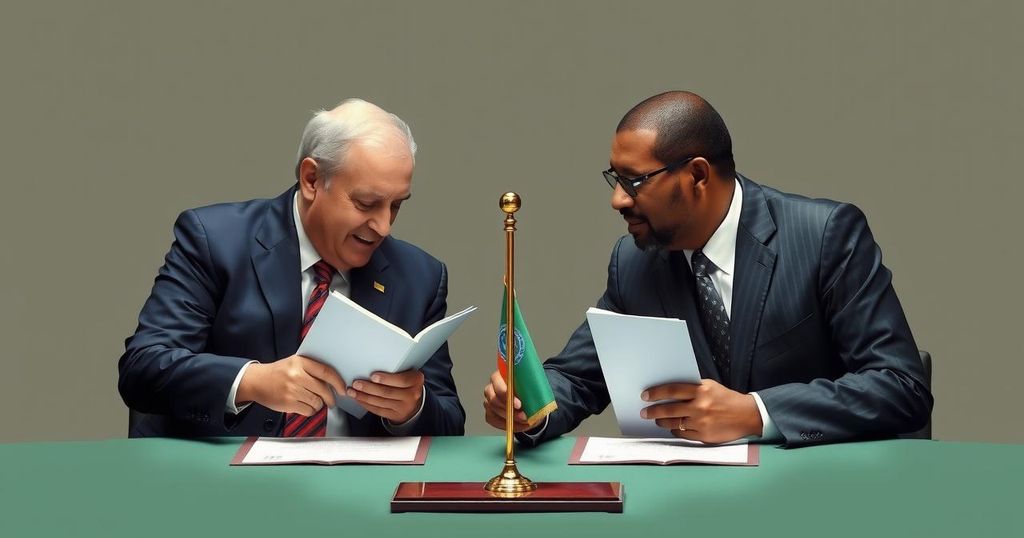Türkiye’s Communications Director praised the Ethiopia-Somalia agreement as a testament to the nation’s peace diplomacy. The Ankara Declaration aims to stabilize regional tensions and uphold the sovereignty of both nations. Additionally, Türkiye’s involvement in the Syrian crisis remains vital as it addresses humanitarian concerns while fostering unity. Altun’s statements reflect Türkiye’s proactive diplomatic strategies in conflict resolution.
On Thursday, Türkiye’s Communications Director, Fahrettin Altun, praised the agreement between Ethiopia and Somalia as a significant demonstration of Türkiye’s commitment to peace diplomacy. He highlighted the agreement, officially known as the Ankara Declaration, completed under Türkiye’s mediation, which underscores the importance of addressing long-standing geopolitical conflicts in the region. Altun remarked that the resolution of this dispute, which was politically costly for both nations, resulted from sustained efforts by Türkiye’s Foreign Ministry along with President Recep Tayyip Erdogan’s diplomatic initiatives.
The Ankara Declaration was signed during a meeting hosted by President Erdogan, attended by Somali President Hassan Sheikh Mohamud and Ethiopian Prime Minister Abiy Ahmed. The leaders reaffirmed their dedication to respecting each country’s sovereignty, unity, and territorial integrity, alongside adherence to international law and the African Union charter. Notably, tensions had escalated following Ethiopia’s agreement with the breakaway region of Somaliland to utilize the strategic Berbera port. Türkiye has actively worked to alleviate strains between the two East African nations.
Addressing the ongoing crisis in Syria, Altun characterized it as a crucial issue affecting Türkiye’s stability and unity. He referred to the last thirteen years as marked by profound atrocities that have marred both world history and human experience. Türkiye, having become a primary refuge for those fleeing the conflict, has maintained a commitment to moral and humanitarian principles while also facing an increase in xenophobic sentiments within its borders.
Amidst these challenges, Altun reiterated Türkiye’s efforts toward aiding Syria’s reconstruction, underlining the necessity of preserving unity across diverse ethnic and religious communities in the country. He also emphasized the importance of thwarting the advancement of terrorist organizations that could exploit political vacuums resulting from ongoing instability, particularly in light of the recent escalations in Syria, including the departure of Bashar Assad to Russia after significant territorial losses to anti-regime factions.
The agreement between Ethiopia and Somalia, facilitated by Türkiye, is seen as a pivotal moment in East African geopolitics, signaling Türkiye’s role as a mediator and peace facilitator in a region beset by conflicts. Tensions between Ethiopia and Somalia have roots in complex historical and political factors, including Ethiopia’s recent engagement with the autonomous region of Somaliland. This situation underscores the involvement of external actors like Türkiye seeking to stabilize the region by promoting dialogue and cooperation. Further, Türkiye’s diplomatic efforts extend beyond Africa, as demonstrated by its approach to the prolonged Syrian crisis, wherein the country endeavors to address both humanitarian issues and geopolitical concerns.
In summary, Türkiye, through strategic diplomatic engagements, has facilitated a significant peace accord between Ethiopia and Somalia. The Ankara Declaration sets a foundation for enhanced stability in East Africa while also reflecting Türkiye’s broader commitment to addressing humanitarian crises and fostering cooperative international relations. As geopolitical dynamics evolve, Türkiye’s role will remain critical, particularly concerning ongoing regional conflicts such as the one in Syria, where issues of territorial integrity and societal harmony are paramount.
Original Source: www.aa.com.tr






